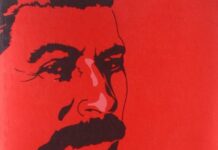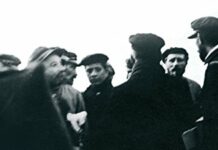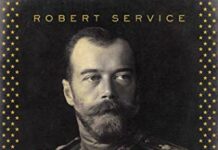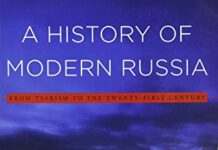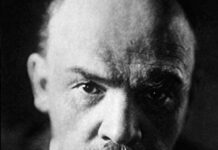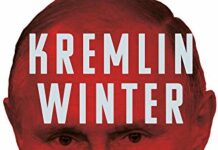
Ebook Info
- Published: 2015
- Number of pages: 688 pages
- Format: PDF
- File Size: 8.78 MB
- Authors: Robert Service
Description
On 26 December, 1991, the hammer-and-sickle flag was lowered over the Kremlin for the last time. Yet, just six years earlier, when Mikhail Gorbachëv became general secretary of the Communist Party of the Soviet Union and chose Eduard Shevardnadze as his foreign minister, the Cold War seemed like a permanent fixture in world politics. Until its denouement, no Western or Soviet politician foresaw that the standoff between the two superpowers—after decades of struggle over every aspect of security, politics, economics, and ideas—would end within the lifetime of the current generation. Nor was it at all obvious that that the Soviet political leadership would undertake a huge internal reform of the USSR, or that the threat of a nuclear Armageddon could or would be peacefully wound down.Drawing on pioneering archival research, Robert Service’s gripping investigation of the final years of the Cold War pinpoints the extraordinary relationships between Ronald Reagan, Gorbachëv, George Shultz, and Shevardnadze, who found ways to cooperate during times of exceptional change around the world. A story of American pressure and Soviet long-term decline and overstretch, The End of the Cold War: 1985–1991 shows how a small but skillful group of statesmen grew determined to end the Cold War on their watch and transformed the global political landscape irreversibly.
User’s Reviews
Editorial Reviews: Review A Times [UK] Book of the Year 2015“The denouement is well known and well told in pointillist detail… [an] admirably even-handed account, which offers a compendium of the expired secrets of the White House and Kremlin.” —Wall Street Journal”The End of the Cold War [is] a massive new study of the last days of the Soviet empire… British historian Robert Service examines newly released Politburo minutes, recently available unpublished diaries, and minutely detailed negotiation records.” —Boston Globe”The End of the Cold War, 1985-1991 [is] a detailed, authoritative, and illuminating account of the end of the competition that defined world politics for more than four decades.” —Christian Science Monitor“The End of the Cold War: 1985-1991 serves as a reminder that the hawks’ memory of Reagan’s Soviet diplomacy is selective and, ultimately, just plain inaccurate…Service succeed[s] in giving the reader a comprehensive account of the meetings and debates in the years leading up to the Soviet collapse.” —Washington Post“Service takes the vast literature on the Cold War’s end, adds newly available archival sources, and pulls it all together into a single massive history of how ‘Washington and Moscow achieved their improbable peace.’ … To cover as many elements as Service does requires very tight writing, even in a big book such as this one: as a result, he settles for sentences rather than paragraphs to cover the necessary ground.” —Foreign Affairs“The great nonfiction book of the year… As a serious and fascinating dive into the events that shaped our world it cannot be bettered.” —Justin Webb, The Times [UK]“Authoritative and scholarly… The End of the Cold War gets all the big questions right. The world was fortunate to have leaders who brought a half-century nightmare to a peaceful conclusion, and his readers will be grateful for Robert Service’s clear explanation of how and why it happened.” —Claremont Review of Books“[Robert] Service’s book is a great investigative achievement…[he] has given us an account, unsurpassable in its detail…” —Bookforum“A riveting read.” —The Telegraph (UK) About the Author Robert Service is a British historian, academic, and author who has written extensively on the history of Soviet Russia, particularly the era from the October Revolution to Stalin’s death. Service is the author of twelve books, including Spies and Commissars; the acclaimed Lenin: A Biography; Stalin: A Biography; and Comrades: A History of World Communism. He is currently a professor of Russian history at the University of Oxford, a Fellow of St. Antony’s College, Oxford, and a senior fellow at Stanford University’s Hoover Institution.
Reviews from Amazon users which were colected at the time this book was published on the website:
⭐A fascinating tale focused on the actors and their personalities and how those affected a history many of us are very familiar with.Service’s credentials are very impressive, but this book desperately needs another proof-reading. In places the delivery is so impaired as to border on gibberish, or at least incomprehensible. In other places there are missing connectives in sentences, dropped words, etc. – things even automated grammar checkers would pick up.I should also like to point out that “And” nor “But” are a proper start to ANY sentence. Those are connectives meant to connect two parts OF THE SAME SENTENCE. Shameful that Service can’t get something so simple, yet fundamental right. Any sentence that starts with an “And” can be fixed by the simplest of minds. You replace the period at the end of the prior sentence with a comma and lower the case of the A in “And”. Mission accomplished. Why then do we see serious material handled in such a careless and stupid manner?The cast of characters is quite large, and personally I wish there were photographs provided of the important players, not just the ones the Reagan Library or the Hoover Institute were happy to provide.Generally speaking the coverage is pretty factual and balanced, but in places the conservative bent of the aforementioned supporters is apparent and that is troubling. I have a feeling this project was seriously behind schedule and Service was pressed to complete “something” – and something is what was delivered. Nothing a 2nd edition with more care and attention to detail couldn’t fix, but that is never a foregone conclusion.
⭐The End of the Cold War by Robert Service showcases the final six years or so of the Cold War 1985-1991. Much of the first part of the book covers how we got to Mikhail Gorbachev in the USSR and The Cold War broadly. Then he takes this panoramic view throughout the big players of Europe and the Soviet Satellite countries. This pattern actually occurs throughout the book as one chapter will cover some element of US-Soviet relations under Reagan and Gorbachev and their surrogates mostly Shultz and Shevardnadze, which a few other faces sprinkled in. Then the next chapter will cover Europe or Communism outside of Moscow. This snapshot format can make it hard for readers to get their barring because once one is into a section, boom it changes.Service has clearly dug through the archives and for that I praise him, but the problem is that at times it reads like somebody dug through the archives and spewed what they learned onto the page. This is my long winded way of saying some context and exposition would be nice, otherwise you just spend your time getting run over by an interesting two pound academic door stop.Yet, if you have a lover of Russian and Eastern European History to shop for, they will love this.
⭐Robert Service is one of the best writers on Communism and their leaders. This book is about the Communist leaders ending with Gorbachev and Yeltsin. It is also about the principal American leaders, mostly Reagan and his advisors. It is also about the British, French and German leaders. The detail is terrific. This is the best summary I have seen on the end of the Cold War, and I have read a lot of them. I am very familiar with the history of the Cold War. For example, I was in Berlin in 1961 when the Wall went up. I have travelled to Russia in 1972 and 2000. I travelled through East Europe in 1972. The Poles just hated the Russians. I have travelled through the Baltic States, and they detest the Russians also.Service did an awesome amount of research. He presents the various factions in the US and USSR that were fighting for positions on disarmament and other key issues vs. just stating a monolithic US position and monolithic USSR position.This book is primarily a political history although it does touch on some economic issues and some military issues. For a more in depth treatment of the military issues, I recommend “The Collapse of the Soviet Military” by General Odom. I have yet to find a good summary on the decline of the USSR economy.In summary, if you are interested in the end of the Cold War, this is the definitive book. Well done Mr. Service.
⭐Long and very detailed account of the last six years of the Soviet Union and the interplay between the Soviets, Americans and others during that time. The detail can cause some impatience to move forward with the tale, but it’s necessary to achieving what the author set out to do, which is to set out a full and accessible record in a secondary source. His long experience and close involvement in the process make the account very useful, and I learned a lot that I did not previously know. (Also reminded of stuff that I had more or less forgotten.) Not the triumphalist account that I had expected based on some reviews. This is the work of a sober, cautious and thoughtful man. We were lucky to have people like him around at the time, and indeed at any time.
⭐Robert Service has written the history from credible sources of the last decade of the Cold War. It is organized by major participant and arrayed chronologically. I served as an Intelligence Director in Strategic Air Command during the last decade of the Cold War but was working at the operational level. I have been looking for a credible history of events occurring at the national strategic level. This book meets that requirement in spades. It answered many questions I had about what exactly happened in the USSR and Warsaw Pact that led to their demise. The book is so comprehensive that it is not an easy casual read. But if you want to know how the world avoided nuclear holocaust as an empire collapsed on itself this book will tell you
⭐This is essential reading if you want to know the full story of how the Cold War was won by the west. Occasionally gets bogged down in detail, but generally well worth persevering with.
⭐Well researched and thorough book. A little dry at times but mostly very readable.
⭐This is the perfect book that highlights with precision the events and personalities that mark the end of the Cold War era. For those who were grown up during the era covered in the book, the reading reflects the news stories and headlines of those times.
⭐a great read and a very detailed description of events of that that time would definitely recommend
⭐A definitive analysis. a very good and informative read!
Keywords
Free Download The End of the Cold War: 1985-1991 in PDF format
The End of the Cold War: 1985-1991 PDF Free Download
Download The End of the Cold War: 1985-1991 2015 PDF Free
The End of the Cold War: 1985-1991 2015 PDF Free Download
Download The End of the Cold War: 1985-1991 PDF
Free Download Ebook The End of the Cold War: 1985-1991
